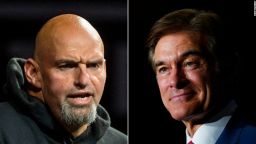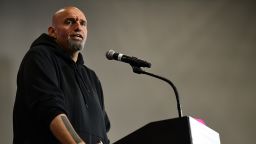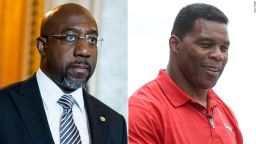Pennsylvania Democratic Senate nominee John Fetterman committed Wednesday to meeting Republican opponent Mehmet Oz for a debate on October 25 – two weeks before Election Day.
Fetterman, the commonwealth’s lieutenant governor, is recovering from a May stroke and has come under pressure from the Oz campaign for refusing to debate or take reporters’ questions at news conferences. Last week, the Democrat announced his intent to debate Oz but did not specify a date or time.
But even with Fetterman now offering more specifics, a new back-and-forth between the campaigns over debate preparation and the length of the event has created new doubts.
In response to Fetterman’s announcement, the Oz campaign said it would “accept the debate invitation” if the Democrat agreed to three conditions tied to what the campaign described as Fetterman’s own requests: that closed-captioning be used during the debate and that he be given two opportunities to “practice” using the system onstage (and off-air) ahead of time.
Oz asked for stipulations that a moderator tell the audience at the beginning of the debate about the closed-caption system; that any practice questions for Fetterman “bear zero resemblance to the actual (debate) questions”; and that the length of the meeting be extended from 60 to 90 minutes because, the Oz campaign said, the format could cause delays.
The Fetterman campaign, in a subsequent statement, said Oz mischaracterized its plans for pre-debate “walk-throughs,” a standard practice, and dismissed the suggestion that it was a bid to rehearse his answers. Fetterman’s team also rejected Oz’s request for the debate to be extended by 30 minutes, citing a previously held agreement with the host.
Fetterman’s campaign agreed to have the moderators explain that the Democrat was using a closed-caption system, adding, “John has been open and honest about his lingering issues with auditory processing.”
Replying to the Oz camp’s demands, Rebecca Katz, Fetterman’s senior adviser, accused the Republican nominee of cynically prolonging the campaigns’ debate over debates.
“Let’s be real: If we agreed to 10 debates, Oz would be demanding 20,” Katz said. “He’s going to keep trying to move the goalposts, because this is his only play.”
Recovery process
Even after Fetterman initially announced he intended to debate Oz, questions lingered over when he might offer to make good on that promise. His speech remains hindered in the aftermath of a stroke that he said nearly killed him, but Fetterman and his campaign insist that his “auditory processing” issues are part of the recovery process and will improve with time.
In an interview this week with The New York Times, Fetterman said he was now “running a perfectly normal” campaign.
“I keep getting better and better, and I’m living a perfectly normal life,” he said.
In the interview, which was conducted via video with closed-captioning to aid with lingering post-stroke difficulties with auditory processing, Fetterman also insisted that his campaign has “never been hiding any health issues.”
But the campaign was slow to release details about the severity of his stroke. Fetterman waited two days to reveal he had a stroke at all, only putting out the information on the Sunday before the May Democratic primary. His cardiologist revealed in June that Fetterman has a heart condition known as cardiomyopathy.
The New York Times interview also detailed the results of a pair of neurocognitive tests taken by Fetterman, which his campaign touted as evidence of his current fitness and continued recovery.
Joe Calvello, a Fetterman spokesman, confirmed to CNN that the candidate had taken multiple neurocognitive tests, including the Saint Louis University Mental Status Examination on July 14 and the Repeatable Battery for the Assessment of Neuropsychological Status, or RBANS, on Wednesday morning.
Calvello said that Fetterman scored at 28 out of 30 on the St. Louis test, a normal result for someone with a high school education and that his results on the RBANS were within the standard range for someone his age. Both tests, he added, were given to Fetterman by his speech therapist.
Fetterman’s most recent public rally was in Blue Bell, Pennsylvania, on Sunday. His speech remains halting at times and, as he acknowledged in the Times interview, he occasionally appears to grasp for words or stumble over an expression.
Last week, Oz was joined by retiring GOP Sen. Pat Toomey at a news conference in which they accused Fetterman of either exaggerating his health issues in order to avoid a debate stage cross-examination or being physically unfit to serve.
“This is not about health, this is about honesty,” Oz said. “It’s either John Fetterman is physically capable of debating and is not debating because he doesn’t want to own the statements that he’s made, the radical left statements that he’s made about so many issues, or he’s lying about his health.”
Key Senate race
The Pennsylvania Senate seat is a top pickup opportunity for Democrats, who are defending their slim majority in the chamber this fall. It is one of the five states that flipped from former President Donald Trump to President Joe Biden in the 2020 election.
Fetterman’s announcement comes as debate participation has become a point of contention between some campaigns nationwide. In Georgia, Democratic Sen. Raphael Warnock and his Republican challenger, Herschel Walker, have agreed to at least one debate after weeks of sparring between the campaigns over televised debates.
In North Carolina’s open Senate race, the campaigns of Democrat Cheri Beasley and Republican Ted Budd agreed to an October 7 debate hosted by Spectrum News. And in Ohio, home to another open-seat Senate contest, tense negotiations between the campaigns of Democrat Tim Ryan and Republican J.D. Vance remain unresolved. Similar stalemates exist in Senate and gubernatorial races across the country.
In their announcement earlier Wednesday, Fetterman’s team touted the October 25 debate, which will be hosted by Nexstar and broadcast across a wide range of affiliates statewide, noting that Oz had previously committed to taking part.
“We said from the start that we’d do a debate, which John reiterated very clearly again last week. Enough distractions, it’s time to talk about the issues,” Katz said.
This story has been updated with additional developments.
CNN’s Michael Warren contributed to this report.





